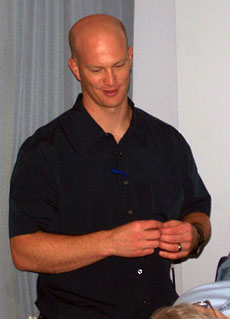Assessments
Your first appointment will be scheduled as an Assessment appointment. This session will take longer than a follow-up appointment (usually 45 minutes to 1 hour). This time is scheduled to be one-on-one with your Physiotherapist.
Assessments identify the source, cause and contributing factors of your concern. The assessment will allow a treatment plan and recommended schedule to be developed to manage your concern. Treatments can start as soon as the same day. For more information on treatments, select the “treatment” button on the right.

When you come to your assessment or regular physiotherapy appointments it is best to dress in flexible clothing. For example, if you have a neck and/or shoulder concerns do not wear a turtle neck shirt, a tank-top or thin strapped top would be best.
There are usually 2 parts to your assessment appointment, subjective and objective.
Subjective (the talking part):
Your physiotherapist will ask questions about your present
condition. You will be asked questions about how and when the
pain, stiffness, or other problems started; what makes the
pain/concern worse and/or better? He or she will ask you how
much it hurts, ask you grade your pain on a scale and ask what
limitations you have at home and work.
Your physiotherapist will ask you about your medical history. This is standard procedure for any type of health related problem. It is important to be thorough in explaining past problems and conditions that run in the family. This may have a bearing on your treatment. Other conditions which could influence outcome include (but not limited to) Diabetes, Cardiac conditions and previous surgeries.
The accuracy of your physiotherapy assessment rests on your answers. Be honest and answer the question to the best of your knowledge. When your physiotherapist knows when the problem began and has an idea of what caused it, your outcome will improve.
Objective Findings (the movement
part):
Your physiotherapist will ask you to perform specific movements
and watch you complete them. He or she will watch you walk and
observe your posture. You will be asked to do some functional
movements like squatting and reaching your hands over your
head. The focus will then become more specific to the body
part(s) which is/are causing your concern. You will be put
through a series of movements that may elicit some discomfort
but will not cause further damage. Strength is tested to see
what capacity you have surrounding your concern. Ligament
stability will be assessed to identify if this is a cause of
your concern/problem. Specific small movements will be tested
to see if this contributes to your concern. Direct pressure
will be placed to the area of concern to identify how sensitive
and what structures might be involved.
It is a part of a good assessment to show all the movements required as best you can, this tells your physiotherapist a great deal of information. The way to make the most of a physiotherapy assessment is to be as honest and accurate as possible. This will facilitate the best care in the future treatments.
